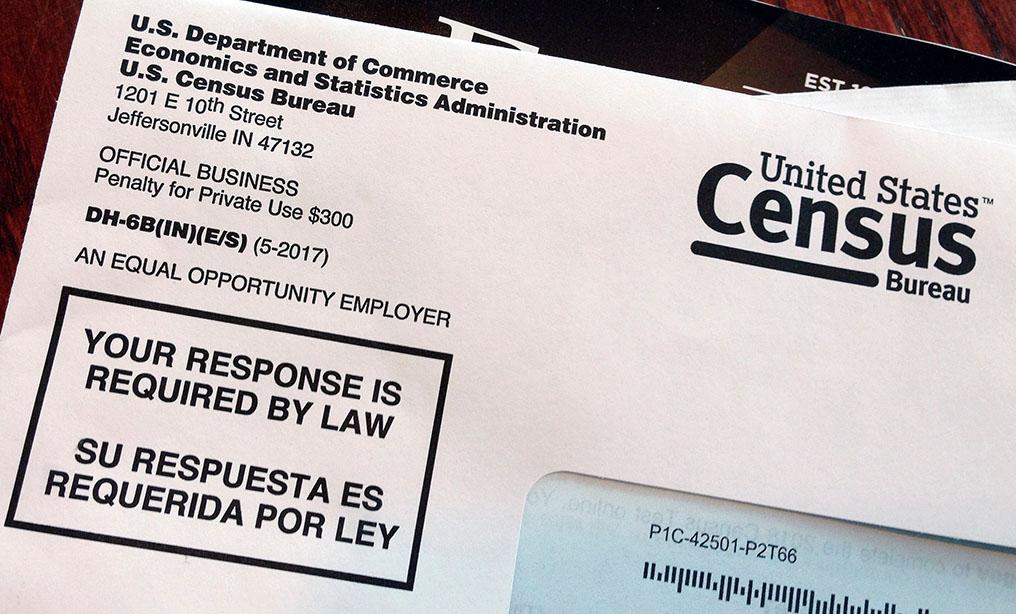Litigation Over Census Question Set for Trial Monday After SCOTUS Rejects Delay Request
The Trump administration has also asked the Supreme Court to delay the trial while it considers a petition on discovery, but the high court had not made a decision on that request by Friday afternoon.
November 02, 2018 at 03:45 PM
6 minute read
The original version of this story was published on New York Law Journal
 An envelope containing a 2018 census letter mailed to a resident in Providence, Rhode Island, as part of the nation's only test run of the 2020 Census. Photo: Michelle R. Smith/AP
An envelope containing a 2018 census letter mailed to a resident in Providence, Rhode Island, as part of the nation's only test run of the 2020 Census. Photo: Michelle R. Smith/AP
The Trump administration's decision to ask U.S. residents about citizenship status on the 2020 Census is set to go to trial Monday morning after the U.S. Supreme Court denied a request from the Trump administration to delay the proceedings.
The Supreme Court said in a one-line order Friday evening that it would not delay the trial beyond the Nov. 5 start date while it reviews a decision from U.S. District Judge Jesse Furman of the Southern District of New York in July that allowed extra-record discovery in the case.
The plaintiffs in the lawsuit, a coalition of states and immigrants' rights groups, will now make their case before Furman on Monday about why the U.S. Commerce Department's decision to ask about citizenship violated the Administrative Procedure Act and the equal protection clause of the Fifth Amendment.
New York Attorney General Barbara Underwood is leading a coalition of 18 state attorneys general in the lawsuit. A different suit from the New York Immigration Coalition on the same issue was consolidated with Underwood's litigation for trial. The group is represented by the American Civil Liberties Union, the New York Civil Liberties Union and Arnold & Porter.
They brought the case earlier this year based on claims that asking about immigration status on the census will lower participation rates in states with large immigrant populations, like New York. That could lead to fewer representatives in Congress and the Electoral College in those states and less federal funding in areas like education and health care.
Attorneys with the U.S. Department of Justice have challenged that argument, calling it “unproven” in their pretrial brief. They said the plaintiffs haven't shown they have enough evidence to back up their claims at trial.
“Plaintiffs' claims of Article III injury rest entirely on the unproven assertion that the reinstatement of a citizenship question will result in a differential undercount of the population because of a decline in self-response, leading to putative detrimental effects on apportionment and federal funding,” the DOJ wrote.
The Trump administration argued in the brief that the plaintiffs have been unable to quantify how many people will avoid the census because of the question, and that the U.S. Census Bureau has procedures in place to follow up with addresses that don't initially respond to the survey. The DOJ plans to present evidence at trial on the latter point, according to their brief.
“Defendants will present considerable evidence of the efforts and resources that the Census Bureau will be devoting to ensure a full and complete enumeration, including the additional efforts and resources the Census Bureau is prepared to expend, if needed, due to the reinstatement of a citizenship question,” the DOJ wrote.
In their own pretrial brief, the plaintiffs wrote that they plan to use the Trump administration's own data and experts against them to rebut those claims.
A report from the U.S. Census Bureau earlier this year, for example, estimated that the self-response rate of noncitizen households could decline by 5.1 percent, or more, if a question about citizenship is added to the census. That report is in the administrative record.
The report was authored by John Abowd, the chief scientist at the Census Bureau. Abowd is the only witness the Trump administration plans to have live at trial. The plaintiffs said in their brief that Abowd testified during his deposition that the estimated decline in response rates caused by the citizenship question could actually be higher than those initial projections.
They also plan to flip the Trump administration's argument on proof by indicating the Commerce Department, itself, had no empirical evidence on the benefits of asking about citizenship before it decided to do so. They claimed the Trump administration decided to add the question, then later tried to come up with a way to justify it.
“Defendants affirmatively sought to conceal their reasons for adding the citizenship question to the census, instead shopping the question to multiple agencies, manufacturing a reason to support it, and constructing a record designed to frustrate judicial review of the actual basis of its decision. Such conduct should not be countenanced,” the plaintiffs wrote.
That position is supported by information obtained through discovery about conversations Commerce Secretary Wilbur Ross had about the issue early on in the Trump administration, the plaintiffs argued. Recent filings have shown that Ross spoke with former White House Chief Strategist Stephen Bannon and Kansas Secretary of State Kris Kobach about the citizenship question shortly after his confirmation last February.
“Steve Bannon, who decried the growth of immigrants of color in this country, not only discussed the citizenship question with Secretary Ross, but had him talk with Kris Kobach, who proudly claimed responsibility for the decision and told Secretary Ross the question was important because it would diminish the political power of immigrants and communities of color,” the plaintiffs wrote.
The Trump administration called that argument “cherry-picking of isolated statements” and said while Ross had considered the question early on in the Trump administration, he didn't make a decision on the issue until much later.
“The secretary's at-times emphatic language merely reflected a concern that the issue be resolved by March 2018, not a desire that it be resolved in a particular way,” the DOJ wrote.
The Supreme Court is currently considering a petition from the Trump administration to review a July decision by Furman that allowed extra-record discovery in the lawsuit. If the court rules against Furman's decision, much of the evidence the plaintiffs plan to present at trial will not be allowed. The deposition of Ross, which was approved by Furman in September, will also be blocked.
Senior trial counsel Elena Goldstein and Executive Deputy Attorney General Matthew Colangelo are leading the case for New York. Kate Bailey is the lead attorney for the Trump administration. The trial is expected to last two weeks.
READ MORE:
Trump Administration Petitions SCOTUS on Discovery Decisions in Census Litigation
Attorneys in Census Litigation Ask Federal Judge to Winnow Evidence for Trial
This content has been archived. It is available through our partners, LexisNexis® and Bloomberg Law.
To view this content, please continue to their sites.
Not a Lexis Subscriber?
Subscribe Now
Not a Bloomberg Law Subscriber?
Subscribe Now
NOT FOR REPRINT
© 2025 ALM Global, LLC, All Rights Reserved. Request academic re-use from www.copyright.com. All other uses, submit a request to [email protected]. For more information visit Asset & Logo Licensing.
You Might Like
View All
Law Firms Expand Scope of Immigration Expertise Amid Blitz of Trump Orders
6 minute read


Zoom Faces Intellectual Property Suit Over AI-Based Augmented Video Conferencing
3 minute readTrending Stories
- 1Uber Files RICO Suit Against Plaintiff-Side Firms Alleging Fraudulent Injury Claims
- 2The Law Firm Disrupted: Scrutinizing the Elephant More Than the Mouse
- 3Inherent Diminished Value Damages Unavailable to 3rd-Party Claimants, Court Says
- 4Pa. Defense Firm Sued by Client Over Ex-Eagles Player's $43.5M Med Mal Win
- 5Losses Mount at Morris Manning, but Departing Ex-Chair Stays Bullish About His Old Firm's Future
Who Got The Work
J. Brugh Lower of Gibbons has entered an appearance for industrial equipment supplier Devco Corporation in a pending trademark infringement lawsuit. The suit, accusing the defendant of selling knock-off Graco products, was filed Dec. 18 in New Jersey District Court by Rivkin Radler on behalf of Graco Inc. and Graco Minnesota. The case, assigned to U.S. District Judge Zahid N. Quraishi, is 3:24-cv-11294, Graco Inc. et al v. Devco Corporation.
Who Got The Work
Rebecca Maller-Stein and Kent A. Yalowitz of Arnold & Porter Kaye Scholer have entered their appearances for Hanaco Venture Capital and its executives, Lior Prosor and David Frankel, in a pending securities lawsuit. The action, filed on Dec. 24 in New York Southern District Court by Zell, Aron & Co. on behalf of Goldeneye Advisors, accuses the defendants of negligently and fraudulently managing the plaintiff's $1 million investment. The case, assigned to U.S. District Judge Vernon S. Broderick, is 1:24-cv-09918, Goldeneye Advisors, LLC v. Hanaco Venture Capital, Ltd. et al.
Who Got The Work
Attorneys from A&O Shearman has stepped in as defense counsel for Toronto-Dominion Bank and other defendants in a pending securities class action. The suit, filed Dec. 11 in New York Southern District Court by Bleichmar Fonti & Auld, accuses the defendants of concealing the bank's 'pervasive' deficiencies in regards to its compliance with the Bank Secrecy Act and the quality of its anti-money laundering controls. The case, assigned to U.S. District Judge Arun Subramanian, is 1:24-cv-09445, Gonzalez v. The Toronto-Dominion Bank et al.
Who Got The Work
Crown Castle International, a Pennsylvania company providing shared communications infrastructure, has turned to Luke D. Wolf of Gordon Rees Scully Mansukhani to fend off a pending breach-of-contract lawsuit. The court action, filed Nov. 25 in Michigan Eastern District Court by Hooper Hathaway PC on behalf of The Town Residences LLC, accuses Crown Castle of failing to transfer approximately $30,000 in utility payments from T-Mobile in breach of a roof-top lease and assignment agreement. The case, assigned to U.S. District Judge Susan K. Declercq, is 2:24-cv-13131, The Town Residences LLC v. T-Mobile US, Inc. et al.
Who Got The Work
Wilfred P. Coronato and Daniel M. Schwartz of McCarter & English have stepped in as defense counsel to Electrolux Home Products Inc. in a pending product liability lawsuit. The court action, filed Nov. 26 in New York Eastern District Court by Poulos Lopiccolo PC and Nagel Rice LLP on behalf of David Stern, alleges that the defendant's refrigerators’ drawers and shelving repeatedly break and fall apart within months after purchase. The case, assigned to U.S. District Judge Joan M. Azrack, is 2:24-cv-08204, Stern v. Electrolux Home Products, Inc.
Featured Firms
Law Offices of Gary Martin Hays & Associates, P.C.
(470) 294-1674
Law Offices of Mark E. Salomone
(857) 444-6468
Smith & Hassler
(713) 739-1250








